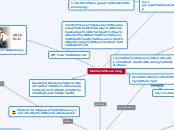Make digital citizens out of our students
Students greater influence/control of their education
“These deeply sedimented habits may be embodied to such an extent that the user is hardly aware of performing them” (2015).
Off-Task Students
learning community
Mobile Learning
four-pronged analytical framework
4. to integrate the environment
3. to leverage prior knowledge, values, attitudes, and beliefs
2. to provide guided participation
1. to augment with technology
can be done in outdoor informal learning institutions
augmented reality
learn about the natural world through mobile devices
supports learners in the natural world
should become a part of the learning culture rather than adjunct to it
devices are a "learning hub"
light-weight and mobile
24/7 access
Seamless Learning
"it is not feasible to equip students with all the skills and knowledge they need for a lifetime solely through formal learning"
formal and informal learning
more personalized learning
three generations
1:1 setting and context-aware technology
moving learning environment as they move
pedagogical design
cognitivism and constructivism
transferring learning content onto mobile devices
information and behaviorism
Literature
hybrid techno-pedagogical
learning theory-based
technical-oriented
"a learning model where a student can learn whenever they are curious in a variety of scenarios and in which they can switch from one scenario or context to another, using the personal device as a mediator."
seamless flow of learning across contexts
linking students in-class and out-of-class experiences
dimensions of
intertwining of individual and collaborative learning
1:1 devices to people
wirelessly connected, mobile, and has multimedia input and output
Integration of the physical world and cyberspace
a leaner's habit of mind which does not require technology.

